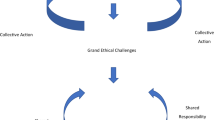Abstract
It is a feature of scientific inquiry that it proceeds alongside a multitude of non-scientific interests. This statement is as true of the scientific inquiries of previous centuries, many of which brought scientists into conflict with institutionalised religious thinking, as it is true of the scientific inquiries of today, which are conducted increasingly within commercial and political contexts. However, while the fact of the coexistence of scientific and non-scientific interests has changed little over time, what has changed with time is the effect of this coexistence on scientific inquiry itself. While scientists may no longer construct their theories with various religious dictates in mind, growing commercial and political interests in science have served to distort the interpretation of science. Using the U.K.’s recent crisis with bovine spongiform encephalopathy (BSE) as my context, I examine two ways in which this distortion has occurred – the interpretation of the science of BSE by politicians and by commercial parties for the purposes of justifying policy decisions and informing the public of risk, respectively. Fallacious reasoning, I contend, is the manifestation of this distortion in these contexts. In demonstration of this claim, I examine how politicians and commercial parties alike have employed two fallacies in their assessments of the science of BSE. These fallacies extend in novel ways the set of so-called traditional informal fallacies. The interpretation of science, I conclude, is a rich context in which to conduct a study of fallacious reasoning; moreover, such a study can contribute in significant ways, I argue, to the public understanding of science.
Similar content being viewed by others
References
D. Boone (1992) ArticleTitleBook Review: Understanding Scientific Reasoning by Ronald N Giere Informal Logic 14 IssueID1 69–74
InstitutionalAuthorNameBSE Inquiry (2000) Findings and Conclusions, Vol. I The Stationery Office London
InstitutionalAuthorNameBSE Inquiry (2000) Human Health, 1989–96, Vol. VI The Stationery Office London
InstitutionalAuthorNameBSE Inquiry (2000) Medicines and Cosmetics, Vol. VII The Stationery Office London
L. Cummings (2002) ArticleTitle‘Reasoning under Uncertainty: The Role of two Informal Fallacies in an Emerging Scientific Inquiry’ Informal Logic 22 IssueID2 113–136
Finocchiaro, M. A.: 1980, Galileo and the Art of Reasoning: Rhetorical Foundations of Logic and Scientific Method, D. Reidel, Dordrecht, Holland.
Giere, R. N.: 1991, Understanding Scientific Reasoning, 3rd edition. Holt, Rinehart and Winston, Fort Worth, TX.
T. Govier (1989) ArticleTitleCritical Thinking as Argument Analysis Argumentation 3 115–126 Occurrence Handle10.1007/BF00128143
C. L. Hamblin (1970) Fallacies Methuen London
M. Krasnican (1952) ArticleTitle‘The Need for Science Classroom Procedures in Thinking’ Science Education 36 123–125
J. Mc Peck (1990) Teaching Critical Thinking Routledge London
N. Rescher (1977) Dialectics: A Controversy-Oriented Approach to the Theory of Knowledge State University of New York Press Albany
D. N. Walton (1989) Informal Logic: A Handbook for Critical Argumentation Cambridge University Press Cambridge, UK
D. N. Walton (1995) A Pragmatic Theory of Fallacy University of Alabama Press Tuscaloosa, Alabama
Wilberforce, S.: 1874, Essays Contributed to the “Quarterly Review”, 2 Volumes. London.
R.G. Will (1993) ArticleTitle‘Epidemiology of Creutzfeldt-Jakob Disease’ British Medical Bulletin 49 IssueID4 960–970 Occurrence Handle8137137
J. Woods D.N. Walton (1974) ArticleTitle‘Argumentum ad Verecundiam’ Philosophy and Rhetoric 7 IssueID3 135–153
J. Woods D.N. Walton (1974) ArticleTitle‘Informal Logic and Critical Thinking’ Education 95 84–86
Author information
Authors and Affiliations
Corresponding author
Rights and permissions
About this article
Cite this article
Cummings, L. Giving Science a Bad Name: Politically and Commercially Motivated Fallacies in BSE Inquiry. Argumentation 19, 123–143 (2005). https://doi.org/10.1007/s10503-004-2070-2
Issue Date:
DOI: https://doi.org/10.1007/s10503-004-2070-2




